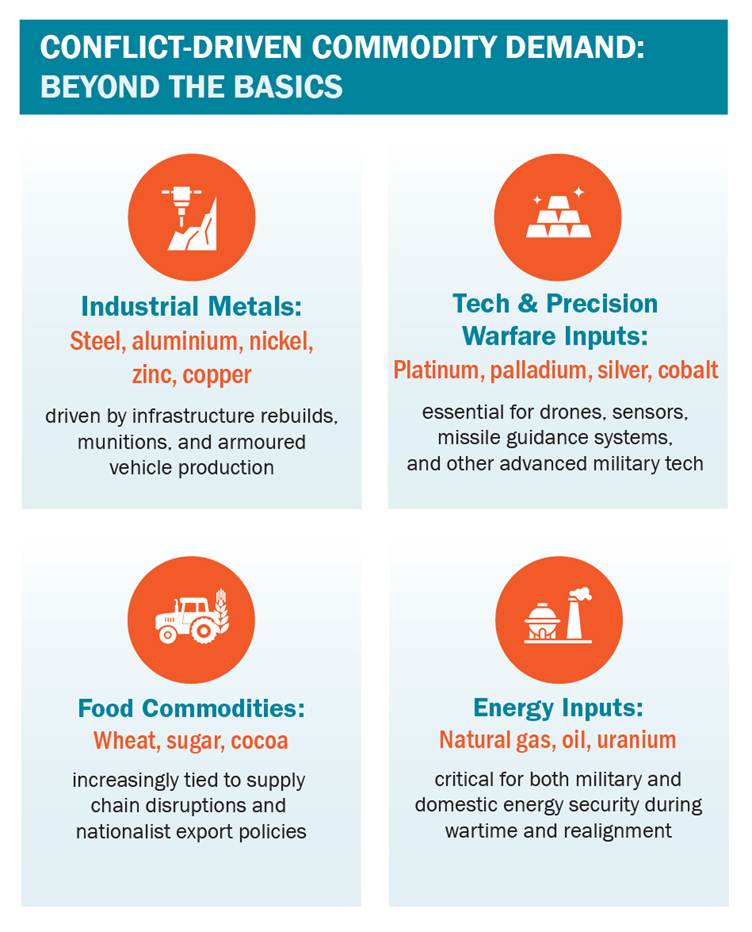Commodities specialist outlines how conflicts typically impact key inputs, highlights why this is a different moment

Normally when a conflict emerges in the world, commodities investors allocate to gold and oil. It’s a simple, if textbook, strategy that accounts for supply chain disruptions and investor anxiety. One commodities specialist, however, notes that amid a level of conflict not seen since WWII commodity strategies need to be more broad-based and sophisticated.
Tim Pickering is the Founder, CIO, and President of Auspice Capital, a veteran commodities manager that espouses a more diversified viewpoint. He explained that conflicts today are lasting longer and occurring with such frequency that their typical shock impacts on commodity markets are less acutely felt. Pickering noted that commodities investors should instead focus on a global commodities supercycle, and where these conflicts play into related trends like European rearmament.
“It's a bit more complex now. These are things that have been building up through social media. We’re flooded with information ahead of conflicts - there’s less surprise, and that dulls market reactions,” Pickering explains. “You don’t see oil spike to $100 every time something happens in the Middle East anymore. The old playbook – buy gold, buy oil – isn’t reliable. It misses the nuance, and worse, the opportunity.
“While gold is often viewed as a safe haven during conflict, its performance can be short-lived or inconsistent,” he adds. “During Russia’s invasion of Ukraine in 2022, gold initially spiked but quickly reversed course, eventually trading back to pre-COVID levels. Meanwhile, other commodities delivered far stronger returns. In today’s environments – where conflicts are prolonged, central banks are active, and commodity demand is structurally driven – relying solely on gold risks missing the broader opportunity.”
Diversification is Pickering’s answer to global conflicts and uncertainty. He asserts that commodities are the most diverse asset class available, with far less correlation than assets like equities or bonds. A broadly diversified allocation, therefore, can help offer hedges against conflict risk and upside from specific geopolitical demand or supply shocks.
Those shocks, even when conflict-related, have come in unexpected places. Wheat, sugar, and cocoa, for example, have all seen different spikes tied to either conflict, geopolitics, or rising nationalist movements around the world. Catalysts for those spikes can be remarkably hard to identify and focusing on a few commodities that an investor assumes are tied to a conflict could, in fact, see them missing out on a much larger opportunity.

Pickering explains that modern conflicts can pull on so many different commodities markets. Beyond food commodities he mentioned earlier as well as gold & oil, he notes that many industrial metals see surging demand from conflict and security concerns. Steel, aluminium, nickel, zinc, tin, and copper all see demand spike due to conflicts and security concerns. Those metals are also seeing increased demand as geopolitical expectations shift and key developed economies, notably European countries, work to rearm and reequip their militaries.
Highlighting another layer of nuance, Pickering notes that rearmament is not just a question of making big steel tanks. Drones, missile guidance systems, and all the highly advanced components of modern warfare require more specialized commodity inputs. Many precious metals — such as platinum, cobalt, palladium, gold, and silver — are tied to the production of these high-tech weapons and systems.
Pickering added that some of the key components of decarbonization, notably battery components like lithium and cobalt, can also be key inputs for defense companies. Energy inputs, like natural gas and oil, as well as next-generation inputs like uranium, can also see significant demand spikes from a more uncertain world.
A common thread of complexity and nuance runs throughout Pickering’s outlook. He emphasizes the futility of trying to time commodity markets or of limiting commodity exposures in the hopes of capturing tailwinds. As advisors talk about opportunities in a changing world with clients, Pickering believes a broad commodity approach needs to be part of the conversation.
“The suggestion for advisors is a broad commodity approach,” Pickering says. “You look at the full landscape of commodities. You don’t bet the farm on a single commodity or even one sector, whether it’s all energy, all metals, or all grains. You want to spread that out, because no one knows which commodity will move next - that’s the nature of global supply chains in a fragmented world. It’s no different than equity investing: sometimes picking one stock – or one commodity like gold – can work in the short term. But over time, just like in equities, a diversified portfolio is what delivers more consistent, reliable results.”



